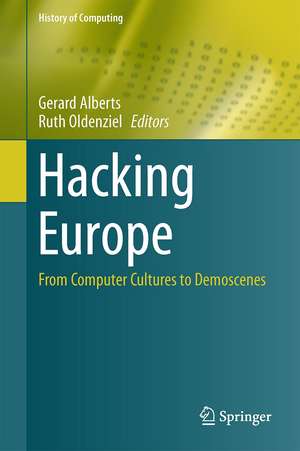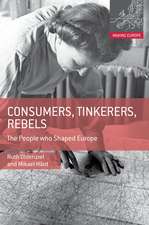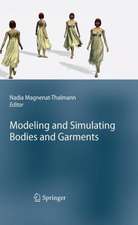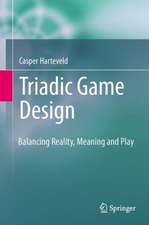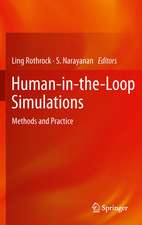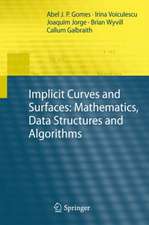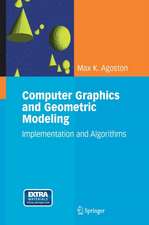Hacking Europe: From Computer Cultures to Demoscenes: History of Computing
Editat de Gerard Alberts, Ruth Oldenzielen Limba Engleză Hardback – 12 sep 2014
| Toate formatele și edițiile | Preț | Express |
|---|---|---|
| Paperback (1) | 639.02 lei 6-8 săpt. | |
| SPRINGER LONDON – 22 sep 2016 | 639.02 lei 6-8 săpt. | |
| Hardback (1) | 764.76 lei 6-8 săpt. | |
| SPRINGER LONDON – 12 sep 2014 | 764.76 lei 6-8 săpt. |
Din seria History of Computing
- 21%
 Preț: 248.72 lei
Preț: 248.72 lei - 20%
 Preț: 276.62 lei
Preț: 276.62 lei - 20%
 Preț: 440.22 lei
Preț: 440.22 lei - 20%
 Preț: 987.57 lei
Preț: 987.57 lei -
 Preț: 291.11 lei
Preț: 291.11 lei - 20%
 Preț: 224.97 lei
Preț: 224.97 lei -
 Preț: 253.85 lei
Preț: 253.85 lei -
 Preț: 294.37 lei
Preț: 294.37 lei -
 Preț: 326.35 lei
Preț: 326.35 lei - 20%
 Preț: 176.49 lei
Preț: 176.49 lei - 20%
 Preț: 270.51 lei
Preț: 270.51 lei - 20%
 Preț: 333.54 lei
Preț: 333.54 lei - 20%
 Preț: 229.81 lei
Preț: 229.81 lei - 20%
 Preț: 273.64 lei
Preț: 273.64 lei - 20%
 Preț: 227.29 lei
Preț: 227.29 lei -
 Preț: 315.80 lei
Preț: 315.80 lei -
 Preț: 479.72 lei
Preț: 479.72 lei - 20%
 Preț: 235.56 lei
Preț: 235.56 lei - 20%
 Preț: 638.55 lei
Preț: 638.55 lei - 20%
 Preț: 216.00 lei
Preț: 216.00 lei - 20%
 Preț: 1008.62 lei
Preț: 1008.62 lei - 20%
 Preț: 270.19 lei
Preț: 270.19 lei - 20%
 Preț: 983.71 lei
Preț: 983.71 lei - 20%
 Preț: 224.50 lei
Preț: 224.50 lei -
 Preț: 375.40 lei
Preț: 375.40 lei - 20%
 Preț: 1046.71 lei
Preț: 1046.71 lei - 20%
 Preț: 645.31 lei
Preț: 645.31 lei -
 Preț: 238.69 lei
Preț: 238.69 lei - 20%
 Preț: 360.71 lei
Preț: 360.71 lei - 20%
 Preț: 281.10 lei
Preț: 281.10 lei -
 Preț: 325.97 lei
Preț: 325.97 lei -
 Preț: 325.43 lei
Preț: 325.43 lei
Preț: 764.76 lei
Preț vechi: 955.95 lei
-20% Nou
Puncte Express: 1147
Preț estimativ în valută:
146.33€ • 152.80$ • 120.84£
146.33€ • 152.80$ • 120.84£
Carte tipărită la comandă
Livrare economică 16-30 aprilie
Preluare comenzi: 021 569.72.76
Specificații
ISBN-13: 9781447154921
ISBN-10: 1447154924
Pagini: 282
Ilustrații: VIII, 269 p. 22 illus.
Dimensiuni: 155 x 235 x 22 mm
Greutate: 0.57 kg
Ediția:2014
Editura: SPRINGER LONDON
Colecția Springer
Seria History of Computing
Locul publicării:London, United Kingdom
ISBN-10: 1447154924
Pagini: 282
Ilustrații: VIII, 269 p. 22 illus.
Dimensiuni: 155 x 235 x 22 mm
Greutate: 0.57 kg
Ediția:2014
Editura: SPRINGER LONDON
Colecția Springer
Seria History of Computing
Locul publicării:London, United Kingdom
Public țintă
ResearchCuprins
Introduction: How European Players Captured the Computer and Created the Scenes.- Part I: Appropriating America: Making One’s Own.- Transnational (Dis)connection in Localizing Personal Computing in the Netherlands, 1975-1990.- “Inside a Day You'll be Talking to it Like an Old Friend”: The Making and Remaking of Sinclair Personal Computing in 1980s Britain.- Legal Pirates Ltd: Home Computing Cultures in Early 1980s Greece.- Part II: Illegitimate Sons in Between: Scences.- Galaxy and the New Wave: Yugoslav Computer Culture in the 1980s.- Playing and Copying: Social Practices of Home Computer Users in Poland During the 1980s.- Multiple Users, Diverse Users: Demoscene and the Appropriation of the Personal Computer by Demoscene Hackers.- Part III: Going Public: How to Change the World.- Heroes Yet Criminals of the German Computer Revolution.- How Amsterdam Invented the Internet: European Networks of Significance 1980-1995.- Users in the Dark: The Development ofa User-Controlled Technology in the Czech Wireless Network Community.
Recenzii
“Hacking Europe fills a glaring hole in the history of computing. … Hacking Europe enterprise opens a whole new area of research, one that could strengthen many adjacent areas of investigation. … Hacking Europe delivers consistent structure, points, and purpose across diverse articles, all in all contributing to the historically specific, geographically aware, use-centered study of computing cultures.” (Maxigas, IEEE Annals of the History of Computing, Vol. 38 (3), July-September, 2016)
“Hacking Europe should pique the curiosity of anyone interested in Cold War technoscience. ... Both readers familiar with history of computing literature and those interested in modern Europe are guaranteed to find something unexpected here … . Beyond the abundance of original material in each of the nine individual chapters, the contributions and an editorial piece in combination present a number of thought-provoking puzzles for a historian of modern science.” (Ksenia Tatarchenko, ISIS, Vol. 107 (2), June, 2016)
“The wealth, diversity and international character of the contributions makes the volume an extraordinary insightful and entertaining read … . Given the popularity of approaches towards social (co-)construction of technology, one can hope that the assembled contributions will spur a stronger interest in the history of home computers, their social meanings, and the subcultures that arose around them. In this domain, this volume will always remain a milestone.” (Gleb J. Albert, European History Quarterly, Vol. 46 (1), 2016)
“Hacking Europe should pique the curiosity of anyone interested in Cold War technoscience. ... Both readers familiar with history of computing literature and those interested in modern Europe are guaranteed to find something unexpected here … . Beyond the abundance of original material in each of the nine individual chapters, the contributions and an editorial piece in combination present a number of thought-provoking puzzles for a historian of modern science.” (Ksenia Tatarchenko, ISIS, Vol. 107 (2), June, 2016)
“The wealth, diversity and international character of the contributions makes the volume an extraordinary insightful and entertaining read … . Given the popularity of approaches towards social (co-)construction of technology, one can hope that the assembled contributions will spur a stronger interest in the history of home computers, their social meanings, and the subcultures that arose around them. In this domain, this volume will always remain a milestone.” (Gleb J. Albert, European History Quarterly, Vol. 46 (1), 2016)
Textul de pe ultima copertă
Hacking Europe focuses on the playfulness that was at the heart of how European users appropriated microcomputers in the last quarter of the twentieth century. The essays argue that users--whether the design of the projected use of computers was detailed or still unfinished--assigned their own meanings to the machines in unintended ways. The book traces the user practices of chopping games in Warsaw, hacking software in Athens, creating chaos in Hamburg, producing demos in Turku, and partying with computing in Zagreb and Amsterdam. Focusing on several European countries at the end of the Cold War, the collection of essays shows the digital development was not an exclusively American affair, but far more diverse and complicated. Local hacker communities appropriated the computer and forged new cultures around it like the hackers in Yugoslavia, Poland and Finland, who showed off their tricks and creating distinct “demoscenes.” Together the essays reflect a diverse palette of cultural practices by which European users domesticated computer technologies. Each chapter explores the mediating actors instrumental in introducing and spreading the cultures of computing around Europe. More generally, the “ludological” element--the role of mischief, humor, and play--discussed here as crucial for analysis of hacker culture, opens new vistas for the study of the history of technology.
This illuminating collection of diverse case studies will be of considerable interest to scholars in a range of disciplines, from computer science to the history of technology, and European-American studies.
Gerard Alberts teaches history of computing and mathematics at the University of Amsterdam. Ruth Oldenziel is a professor at the Eindhoven University of Technology and is a Fellow at the Rachel Carson Center, Munich in 2013-2014.
This illuminating collection of diverse case studies will be of considerable interest to scholars in a range of disciplines, from computer science to the history of technology, and European-American studies.
Gerard Alberts teaches history of computing and mathematics at the University of Amsterdam. Ruth Oldenziel is a professor at the Eindhoven University of Technology and is a Fellow at the Rachel Carson Center, Munich in 2013-2014.
Caracteristici
Describes how local hacker communities across Europe appropriated the computer and forged new cultures around it Explores the mediating actors instrumental in introducing and spreading the cultures of computing around Europe Highlights the role of mischief, humor, and play in hacker culture Includes supplementary material: sn.pub/extras
